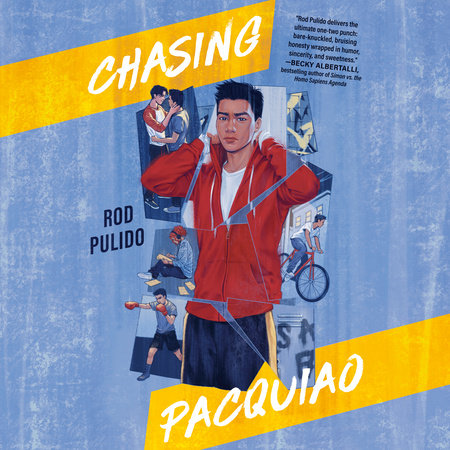By Brigette Hinnant

In Rod Pulido’s young adult debut novel, Chasing Pacquiao, the main character, Bobby, is a nerdy Filipino guy who tries to stay out of the spotlight while at school. He lives by the motto of “self preservation”—one that gets disrupted when he is unexpectedly outed as gay. While Bobby’s mother is not homophobic, Bobby goes to a school with other Filipino students who are homophobic. Once Bobby is outed, a Filipino homophobic slur is thrown at him. Due to being outed, he garners the attention of a group of homophobic, trouble-making classmates who want Bobby’s bike. A fight breaks out after he tries to prevent his bike, his last piece of memorabilia from his late father, from being stolen. However, Bobby loses the fight, which results in him losing his father’s bike as well.
In Bobby’s attempt to get his bike back, he decides that he needs to get stronger to defend himself from his bullies, but also to win his bike back in a rematch against them. Bobby thus decides to take up boxing to learn self-defense, taking inspiration from world-famous Filipino boxer, Manny Pacquiao. Bobby’s best friend, Rosie, and his boyfriend, Brandon, attempt to help Bobby on his journey of gaining the strength to tackle his problems head-on—both regarding his beloved bike, and his life overall.
Race and class are central to understanding Pulido’s novel. Bobby is the child of Filipino immigrants who found a home in Filipinotown, an impoverished part of Los Angeles. Due to his father dying when Bobby was young, his mother, a waitress, is the breadwinner of the household, which makes finances tight. After Bobby’s fight with his bullies, he refuses medical care because “We don’t have insurance. There’s no way Mom could afford a trip to the ER.” So, when Bobby decides that he needs to defend himself, he looks to Pacquiao for inspiration. Pacquiao is more than just a boxer to Bobby, though. When Bobby was younger, Pacquiao visited Filipinotown and “passed out five hundred free turkeys to the people of Historic Filipinotown,” where his family was able to get a free turkey which provided his family food for a long time, adding a personal element to Bobby’s search for inspiration and motivation in the form of Pacquiao.
Bobby also has to confront his feelings of financial insecurity with regards to his boyfriend, Brandon, because Brandon comes from a well-off family. Brandon drives a BMW as a high schooler, which reminds Bobby of how little he has in comparison. So, when Bobby decides to take up boxing, he convinces Luke, the owner of a boxing gym, to give him free lessons by becoming a janitor for the gym.
Chasing Pacquiao is, first and foremost, a story about queer acceptance. Bobby explores his sexuality throughout the novel to understand himself more and break through the negative preconceived notions that are held against queer youth, especially towards queer boys who are seen as effeminate and as some would believe, “not real men.” Toxic masculinity negatively affects young boys and teenagers in ways that can affect them into adulthood. Through characters like Rex, one of Bobby’s bullies, Pulido also explores the relationship between abuse in the home and the resultant anger that is often funneled towards others, adding layers to the narrative. In Chasing Pacquiao, characters like Bobby, who “blend in” with the heterosexual characters in the book, offer a more expansive representation of queer teenagehood. In this novel, queerness can look like anything: it can both take the appearance of and subvert heterosexual expectations; it can look like what many people might consider “straight.”. This is not to say that Pulido is making an argument for heteronormativity, but rather that he is creating space for queer characters to feel like they belong and can find community, even as Bobby confronts his bullies.
Chasing Pacquiao is a family-friendly book that also deals with heavy concepts, such as homophobia, in a way that is easy for a general audience to understand. Pulido uses nerdy humor, making references to Marvel and DC comic book characters throughout the book to give humanity to the characters and to avoid making the book read as solely doom and gloom. One way that nerdy humor is used throughout the novel is through the inclusion of tanagas, a type of Filipino poetry with a structure similar to haikus, throughout the story. These tanagas relate to nerdy culture, such as Marvel and DC comics, and one such poem is present as early as the first page of the novel. Teenagers and young adults would definitely be the primary audience because it takes place in high school, a time when people often start to figure out their sexual and gender identities. The themes are heavy, but Pulido does a good job at making the book palatable for a wide array of audience members.

Brigette Hinnant is a current graduate student at Washington State University in the MA rhetoric and composition program. Her fields of study are Asian American studies, decolonial theory, and feminist theory.